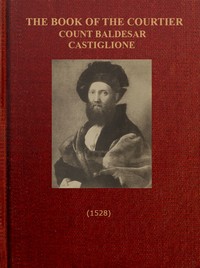The Book of the Courtier by conte Baldassarre Castiglione
"The Book of the Courtier" by conte Baldassarre Castiglione is a philosophical dialogue composed between 1508 and 1528. Set over four evenings at the Renaissance court of Urbino, the work presents courtiers debating what makes an ideal gentleman worthy of serving a prince. They discuss noble rank, physical prowess, artistic knowledge, proper speech, and the mysterious quality of *sprezzatura*—a studied nonchalance that conceals effort. The book also explores humor, love, and the
nature of the perfect court lady, creating a portrait of a vanishing world. (This is an automatically generated summary.)
Read or download for free
| How to read | Url | Size | |||
|---|---|---|---|---|---|
| Read now! | https://www.gutenberg.org/ebooks/67799.html.images | 1.5 MB | |||
| EPUB3 (E-readers incl. Send-to-Kindle) | https://www.gutenberg.org/ebooks/67799.epub3.images | 7.2 MB | |||
| EPUB (older E-readers) | https://www.gutenberg.org/ebooks/67799.epub.images | 7.2 MB | |||
| EPUB (no images, older E-readers) | https://www.gutenberg.org/ebooks/67799.epub.noimages | 599 kB | |||
| Kindle | https://www.gutenberg.org/ebooks/67799.kf8.images | 7.6 MB | |||
| older Kindles | https://www.gutenberg.org/ebooks/67799.kindle.images | 7.5 MB | |||
| Plain Text UTF-8 | https://www.gutenberg.org/ebooks/67799.txt.utf-8 | 1.1 MB | |||
| Download HTML (zip) | https://www.gutenberg.org/cache/epub/67799/pg67799-h.zip | 7.5 MB | |||
| There may be more files related to this item. | |||||
Similar Books
About this eBook
| Author | Castiglione, Baldassarre, conte, 1478-1529 |
|---|---|
| Translator | Opdycke, Leonard Eckstein, 1858-1914 |
| Uniform Title | Il libro del cortegiano. English |
| Title | The Book of the Courtier |
| Original Publication | United Kingdom: Duckworth & Co.,1901. |
| Note | Wikipedia page about this book: en.wikipedia.org/wiki/The_Book_of_the_Courtier |
| Credits | KD Weeks, Tim Lindell and the Online Distributed Proofreading Team at www.pgdp.net (This file was produced from images generously made available by The Internet Archive/American Libraries.) |
| Reading Level | Reading ease score: 52.9 (10th to 12th grade). Somewhat difficult to read. |
| Language | English |
| LoC Class | BJ: Philosophy, Psychology, Religion: Ethics, Social usages, Etiquette, Religion |
| Subject | Courtesy -- Early works to 1800 |
| Subject | Courts and courtiers -- Early works to 1800 |
| Category | Text |
| EBook-No. | 67799 |
| Release Date | Apr 8, 2022 |
| Most Recently Updated | Oct 18, 2024 |
| Copyright Status | Public domain in the USA. |
| Downloads | 4381 downloads in the last 30 days. |
| Project Gutenberg eBooks are always free! | |

